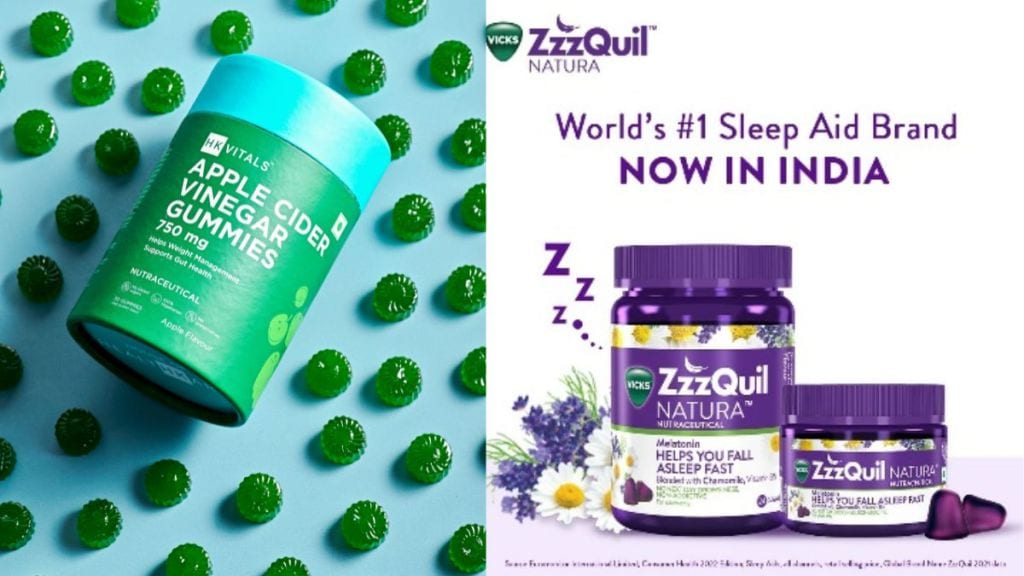The saying goes that “form follows function”. However, at a time when consumer attention is described as the ‘New Oil’ — the world’s most precious resource — another contender has entered the ring: engagement. And when you are a marketer peddling supplements, you would do well to focus on form to truly break through.
So if you are a parent concerned about your child’s growth, you can choose between Horlicks’ multivitamin gummies that come in teddy shape and strawberry colour or those offered by Mankind Pharma under the Health OK brand. Or if you are a budding model looking for Lady Lilith’s flowing locks, those round and green Biotin gummies marketed by OZiva could be your answer.
That is not all. Those chewable candies promise to help you manage myriad health issues – ranging from digestive troubles to sleeplessness. This segment accounts for about 9% of the country’s `65,000-crore nutraceuticals market. This market is also one of the fastest-growing. Amway India’s recent research showed about 48% of new-age consumers look for tasty and convenient options to supplement their diets.
YongChiat Wong, group head and scientist, medical and technical affairs, P&G Health, which offers ZzzQuil Natura gummies to sleepless Indians, says gummies are becoming popular because consumers feel more comfortable popping things that do not look anything like problem-solution pills. “Besides providing health benefits, another advantage of the gummy supplement is that it can cater to different taste profiles,” he adds.
Like many other markets, this market got a boost post Covid when more consumers became open to the idea of using nutraceuticals and health supplements. Traditionally, vitamins and minerals were available in tablet and capsule; what changed more recently is the format and marketing aimed to attract a larger set of audiences. Besides Horlicks, P&G and HealthKart, a host of new brands have thrown their hats into the ring.
That said, marketers feel there are still some hesitation among people about their effectiveness — something that can be overcome through consumer education. “There is a need to create awareness about the category to hasten growth,” says Sahil Sethi, senior marketing director, P&G Health.
Focus on consumer education
Plant-based wellness brand OZiva has gone past pushing products and is offering expert guidance by its in-house team of nutritionists. It currently offers hair gummies that, it claims, are free of added sugars, artificial sweeteners and colours and are available across various channels including its website, e-commerce platforms, and chemist and beauty stores.
For its part, Nyumi, which was launched in 2021 with five nutraceutical products in the gummy form to tackle the most prevalent women-centric issues of hair, skin, sleep, and urinary tract wellness, is banking on bite-sized content to educate consumers on the need for multivitamins and holistic wellness practices.
For HealthKart, the focus is on being transparent about its ingredients and educating consumers about these ingredients and their benefits. “As a nutraceutical brand, you have to be more responsible towards your consumers and make sure you are not misleading them with false information,” says Chella Pandyan, COO, HealthKart. Currently, it has apple cider vinegar, and multivitamin gummies as part of its portfolio, which it plans to expand sooner than later.
While consumer education remains the top priority for these brands, a big challenge is to ensure consistency of format which make them susceptible to heat and may melt while being transported under high ambient temperature. Ensuring proper storage at the retail end is also something that needs constant attention.
Another major challenge that brands or companies have to overcome is keeping the formulation and ingredients clean without artificial additives, fillers, and high amount of sugar, says Mihir Gadani, co-founder and COO, OZiva.
What keeps the brands optimistic is the growing demand from smaller cities. The growth in Tier 2 and Tier 3 cities is catching up with demand in metros in some categories, say experts, with 30-40% of consumer demand witnessed from the smaller cities since Covid derailed demand in most categories.

